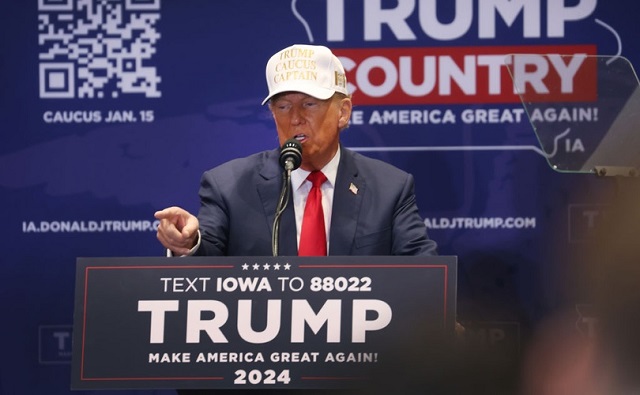International
Trump declared winner of Iowa caucus; DeSantis beats out Haley for second place

From LifeSiteNews
The former president reportedly took home 51% of the vote. He has consistently held a commanding lead over his nearest competitors.
DES MOINES, Iowa — The Associated Press called the Iowa caucuses for former U.S. President Donald Trump on Monday night, with Trump scoring an unprecedented victory in the nation’s first nominating contest of the 2024 election cycle. The victory came after Republican voters in Iowa took to the ballots despite blizzard conditions as the fight for the White House begins to take shape.
The Associated Press called the election for Trump just 30 minutes after voting began. Early numbers showed Trump taking home more than 50% of the vote while Haley and DeSantis struggled for second place with roughly 20% of the vote each.
Later Monday night, Trump was the decisive victor with 51%. DeSantis was reported as having nabbed second place with just over 21% of the vote, edging out Haley who scored 19%.
Ramaswamy, in fourth, has officially dropped out of the race and announced his endorsement of Trump.
Responding to the news of his victory on Truth Social, Trump wrote, “THANK YOU IOWA, I LOVE YOU ALL!!!”
Reuters noted that the former president’s massive win in Iowa represents “an unprecedented margin for an Iowa Republican contest.” Prior to Monday night’s victory, the outlet noted, “The largest margin of victory for an Iowa Republican caucus had been 12.8 percentage points for Bob Dole in 1988.”
While Trump has been the far-and-away favorite of Republicans by polling data, it remains to be seen how good of a predictor the Iowa results will be given some unique conditions for the state this year.
Election watchers had predicted that the Iowa caucuses could suffer from low participation due to record-breaking winter weather that would likely keep many Iowans indoors and off icy roads.
Describing the brutal wintry conditions as “intimidating even for Iowa,” the Associated Press suggested that “[e]lderly Iowans, the backbone of the caucus,” had been “wondering how they will make it to their [voting] sites Monday.” The hazardous conditions have left “[p]olitical types … mentally downgrading their expected turnout and wondering who a smaller, harder-core electorate will favor.”
On Sunday, Trump joked to rally-goers that voting was so important that Republicans should head to their voting locations even if they had to risk death.
“If you want to save America from crooked Joe Biden, you must go caucus tomorrow,” Trump told the crowd. “You can’t sit home. If you’re sick as a dog, even if you vote and then pass away, it’s worth it.”
“You get up, you’re voting,” he said.
“You be safe and all, you’re going to be safe,” Trump told supporters. “Again, all indoors, it’s going to be all indoors. But you gotta get up, you gotta vote because it has nothing to do with anything but taking our nation back, and that’s the biggest thing there is.”
Trump’s big Monday night win comes as the Republican field has significantly winnowed, even ahead of Ramaswamy’s decision to step off the campaign trail. Facing an insurmountable lead by Trump, Haley and DeSantis have been left merely fighting for second place.
After a high-profile endorsement and cash influx from the Americans for Prosperity Action super PAC last month, Haley began to outpace DeSantis for the second-place slot behind Trump, who has consistently held a crushing double-digit lead over his nearest competitor. The latest polling data has appeared to line up with the Iowa results, showing Trump far ahead of Haley, followed by DeSantis in third place and entrepreneur Ramaswamy bringing up the rear.
The results come even as Trump has kept an uncharacteristically low profile in the lead-up to the primaries, contending with a barrage of legal challenges and even efforts to remove him from state primary ballots while nonetheless enjoying extremely high levels of support among the Republican base. DeSantis’ stagnant campaign has meanwhile proved a disappointment to supporters who rallied behind him after his strong conservative leadership during the COVID-19 pandemic and staunch advocacy for right-wing cultural issues.
While Trump appears an almost definite pick for the nomination, speculation has abounded concerning who he will choose as a running mate.
The former president’s recent comments lashing out at pro-MAGA Ramaswamy have dampened rumors he might choose the young firebrand for his second in command. Meanwhile, Haley’s gains in the polls had made her the subject of vice presidential rumors. Choosing Haley could signal that Trump is looking to move further to the center rather than the right as he aims to secure a second term in the White House, something pro-life Americans have already noticed as Trump has touted abortion exceptions and rejected a federal ban.
However, Haley has sought to distance herself from the speculation, and on Sunday Trump appeared to dismiss her, suggesting the 51-year-old wasn’t “tough enough” to handle the duties of the presidency, particularly dealing with dictators in nations like Russia and China.
Meanwhile, the Iowa caucuses are just the start of the Republican primaries. Voters in New Hampshire will have the next opportunity to choose who they would like to lead the party. The New Hampshire primary election will take place January 23.
Business
Trump family announces Trump Mobile: Made in America, for America

 MxM News
MxM News
Quick Hit:
On the 10-year anniversary of Donald Trump’s iconic campaign launch, the Trump family announced the debut of Trump Mobile, a new wireless company offering American-built smartphones, 5G coverage, and a values-driven alternative to Big Tech carriers.
Key Details:
-
Donald Trump Jr. and Eric Trump introduced Trump Mobile’s flagship service Monday, calling it a “transformational” alternative aimed at “our nation’s hardest-working people.”
-
The “47 Plan,” priced at $47.45/month, offers unlimited talk, text, and data, free international calls to U.S. military families, telehealth, roadside assistance, and no credit checks.
-
Trump Mobile’s customer support is fully U.S.-based and live 24/7—“not automated,” the company says—while a new American-made “T1 Phone” is slated for release in August.
Diving Deeper:
Marking ten years since President Donald Trump descended the golden escalator to launch his first campaign, the Trump Organization on Monday announced its boldest private sector move yet: Trump Mobile.
Flanked by company executives, Donald Trump Jr. and Eric Trump unveiled the new cellular service, touting it as a patriotic, people-first alternative to legacy providers. “We’re building on the movement to put America first,” Trump Jr. said in a statement. “We will deliver the highest levels of quality and service.”
The cornerstone of Trump Mobile is the 47 Plan. Offered for $47.45/month, the plan includes unlimited data, full 5G coverage across all three major carriers, and a suite of benefits tailored to middle-class families, truckers, veterans, and anyone tired of paying premiums to companies that don’t share their values.
Among the key perks: 24/7 American-based customer service (with “real people,” not bots), comprehensive device protection, roadside assistance through Drive America, and telehealth services including mental health support and prescription delivery. Most notably, the plan includes free international calling to over 100 countries—an effort the Trump family says honors U.S. military families stationed abroad.
“We’re especially proud to offer free long-distance calling to our military members and their families,” said Eric Trump. “Those serving overseas should always be able to stay connected to the people they love back home.”
Unlike traditional providers, Trump Mobile advertises no contracts and no credit checks, appealing to a demographic long underserved by mainstream telecom giants. “Hard-working Americans deserve a wireless service that’s affordable, reflects their values, and delivers reliable quality they can count on,” Eric Trump added.
The company is also preparing to launch the T1 Phone in August—a sleek, gold smartphone “engineered for performance” and “proudly designed and built in the United States.” With that, the Trump Organization is not just entering the mobile market—it’s staking a claim as a direct competitor to Apple and Samsung.
conflict
Trump leaves G7 early after urging evacuation of Tehran

Quick Hit:
President Trump will leave the G7 summit early following rising tensions in the Middle East. In a Truth Social post Monday night, he warned “everyone should immediately evacuate Tehran” and slammed Iran for rejecting a proposed nuclear deal.
Key Details:
-
“Iran should have signed the ‘deal’ I told them to sign,” Trump posted on Truth Social Monday night, warning that “IRAN CAN NOT HAVE A NUCLEAR WEAPON.”
-
“Everyone should immediately evacuate Tehran,” he added, echoing warnings from Israeli officials issued earlier in the day ahead of expected military operations.
-
Trump’s press secretary, Karoline Leavitt, confirmed he will leave the G7 in Alberta after a working dinner with world leaders, citing the evolving conflict in the Middle East.
Diving Deeper:
President Donald Trump will cut his G7 visit short and return to the United States Monday night after issuing an urgent warning for mass evacuations in Iran’s capital city. The message, shared on his official Truth Social account, came amid intensifying military conflict between Israel and Iran.
“Iran should have signed the ‘deal’ I told them to sign. What a shame, and waste of human life,” Trump wrote. “Simply stated, IRAN CAN NOT HAVE A NUCLEAR WEAPON. I said it over and over again! Everyone should immediately evacuate Tehran!”
The post follows Israel’s repeated missile strikes on Iranian targets, including nuclear facilities and regime leadership, in response to Tehran’s escalated provocations. Monday marked the fourth consecutive day of fighting between the two nations.
Earlier in the day, Israeli officials had already advised residents in northeastern Tehran to evacuate, foreshadowing continued strikes. According to Israeli military estimates, one-third of Iran’s ballistic missile launchers have been destroyed so far in the renewed conflict.
While attending the G7 summit in Canada, Trump emphasized the gravity of the situation. His press secretary, Karoline Leavitt, confirmed that he will depart after dinner with fellow heads of state. “Much was accomplished,” she posted, noting a major trade deal signed with the UK, “but because of what’s going on in the Middle East, President Trump will be leaving tonight.”
-

 Alberta1 day ago
Alberta1 day agoAlberta’s grand bargain with Canada includes a new pipeline to Prince Rupert
-

 Bruce Dowbiggin14 hours ago
Bruce Dowbiggin14 hours agoWOKE NBA Stars Seems Natural For CDN Advertisers. Why Won’t They Bite?
-

 Business1 day ago
Business1 day agoCarney’s European pivot could quietly reshape Canada’s sovereignty
-

 Energy15 hours ago
Energy15 hours agoCould the G7 Summit in Alberta be a historic moment for Canadian energy?
-

 Crime2 days ago
Crime2 days agoManhunt on for suspect in shooting deaths of Minnesota House speaker, husband
-

 Crime15 hours ago
Crime15 hours agoMinnesota shooter arrested after 48-hour manhunt
-

 conflict8 hours ago
conflict8 hours agoIsrael bombs Iranian state TV while live on air
-

 Aristotle Foundation12 hours ago
Aristotle Foundation12 hours agoThe Canadian Medical Association’s inexplicable stance on pediatric gender medicine



